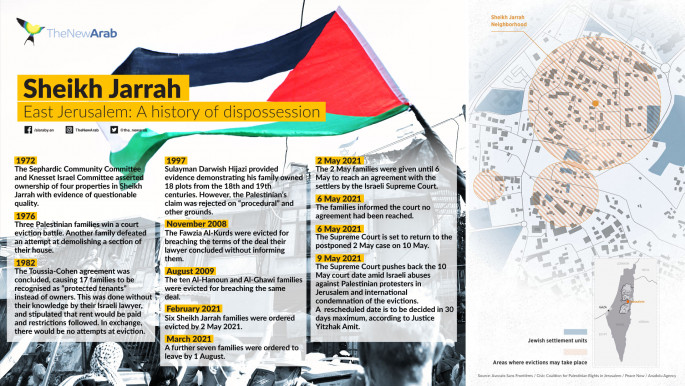As Eid begins, Palestinian Muslims and Christians unite against violence and displacement
The sour stench of skunk water still lingered in the morning air. A metal barricade, surrounded by Israeli police with guns strapped to their chests, blocked the entrance of the Sheikh Jarrah neighbourhood. On the streets, confrontations between Palestinians and Israeli settlers erupted every few hours.
But amid the heightened tensions, a brief moment of peace and camaraderie emerged as Palestinian Christians and Muslims joined together to mark the Eid holiday.
A group of Palestinian Christians met with Sheikh Jarrah residents to wish them a happy Eid on Friday. Clergy and residents took turns expressing their solidarity with each other in between sipping coffee and eating sweets.
"The Christian Palestinian people are all together as a partnership with the Muslim families in Sheikh Jarrah," the Archbishop Theodosios of Sebastia from the Greek Orthodox Patriarchate of Jerusalem said during the visit.
"We are against the Nakba, and now another Nakba is happening in Sheikh Jarrah," he said, referring to the forcible displacement of several Palestinian families from their homes in Sheikh Jarrah so that Israeli settlers can move in. He compared today's events to Israel's 1948 ethnic cleansing campaign of Palestine (also known as the Nakba) and when Israel annexed East Jerusalem in 1967. This Saturday marks the 73rd anniversary of the Nakba.
Under the shade of blooming trees, Adel al-Budairi, a Muslim resident of Sheikh Jarrah, welcomed the Christian group into the courtyard of his home. He explained, though, that interfaith solidarity is not new to Palestine.
 |
We are against the Nakba, and now another Nakba is happening in Sheikh Jarrah |  |
"The whole country is one hand. It doesn't matter where they're coming from and what their religion is, Christian and Muslims have always been together and supporting each other since a very long time ago and they're going to continue supporting each other for the future," al-Budairi said.
Al-Budairi comes from one of the families under threat of expulsion in Sheikh Jarrah. The Jerusalem District Court ruled in April for him to vacate his home by August.
As he spoke, friends and relatives of Sheikh Jarrah residents hoping to celebrate Eid are denied entry into the area by law enforcement. According to the police, only residents are allowed in. Even Christian groups have had to receive special permission from the police in order to enter.
No matter their religion, Palestinians remain together
During the final days of Ramadan, Israeli security forces stormed Al-Aqsa Mosque and attacked worshippers with rubber bullets, tear gas, and stun grenades.
![Palestinian Christians meet with Sheikh Jarrah residents for Eid. [TNA/Jessica Buxbaum]](https://www.newarab.com/sites/default/files/styles/medium_16_9/public/media/images/424775D2-5A59-473E-96E6-B6135BECB096.jpeg?h=d1cb525d&itok=NKiXCsxg) |
| Palestinian Christians meet with Sheikh Jarrah residents for Eid. [TNA/Buxbaum] |
In the wake of the violence, Palestinian Catholic priest, Father Manuel Musallam, called on Christians to join their Muslims brethren and protect Al-Aqsa compound.
"Whoever is not with his people in war is not entitled to be with them in times of peace," Musallam wrote in a Facebook post on Sunday. "This is the day… when Christians will affirm to Muslims that we all have one destiny and one civilisation, that we are one people in this holy land."
Muslims are not the only religious group in Palestine experiencing Israeli police brutality, however. Just two weeks ago, police prevented Orthodox Christians, including priests, from accessing the Holy Church of Sepulchre for the Holy Fire Ceremony, which signifies Jesus' resurrection.
According to Palestinian news agencies, police erected barricades around the holy site and assaulted participants. Two people were arrested for raising the Palestinian flag, a crime in Jerusalem.
Rev. Fr. Jamal Khader, a Ramallah priest and director of the Latin Patriarchate Schools in Palestine, emphasized how the shared attacks on religious worship unify Palestinians.
 |
Whoever is not with his people in war is not entitled to be with them in times of peace |  |
"We share the same space. We shared the same city. It's our city. And what happens in Damascus Gate, for example, concerns everyone," Khader said, mentioning the Israeli violence against Palestinians at Damascus Gate.
"So, there are signs of solidarity, of course, but that's not the main point. The main point is that we are all together in this because it's a city that should be for all its inhabitants, regardless of their religion - Muslims, Christians, and Jews."
One people
While the Palestinian people are often associated with Islam, the birthplace of Christianity is Palestine. Sally Abed, resource development director at Standing Together, an Arab-Jewish partnership movement, understands there's an Islamization of the Palestinian struggle, though, especially when the Al-Aqsa Mosque is used as an iconic symbol of Palestinian resistance.
 |
| Click here to enlarge |
"You go to the protests and it's a lot of 'Allahu Akbar,' and I'm like, okay, but I don't think it in any way excludes me as a Palestinian or as a Christian either," Abed said.
On Saturday, the Heads of Churches in Jerusalem are visiting Sheikh Jarrah to stand in solidarity with residents facing displacement. As unity between the faiths continues, Yaqub al-Waerih, a resident of Sheikh Jarrah who is currently not under risk of forcible eviction, stressed that the focus should not be on religion.
"We want to erase the name of Muslim and Christian from our identity, because we are all Palestinians and we support the same cause and we support each other all the time," al-Waerih said. "Even though we live in Sheikh Jarrah, it doesn't mean that this property belongs to the Muslim families or Christian families. The property belongs to the Palestinians."
Jessica Buxbaum is a Jerusalem-based journalist covering Palestine and Israel. Her work has been featured in Middle East Eye, The National, and Gulf News.
Follow her on Twitter: @jess_buxbaum







 Follow the Middle East's top stories in English at The New Arab on Google News
Follow the Middle East's top stories in English at The New Arab on Google News


